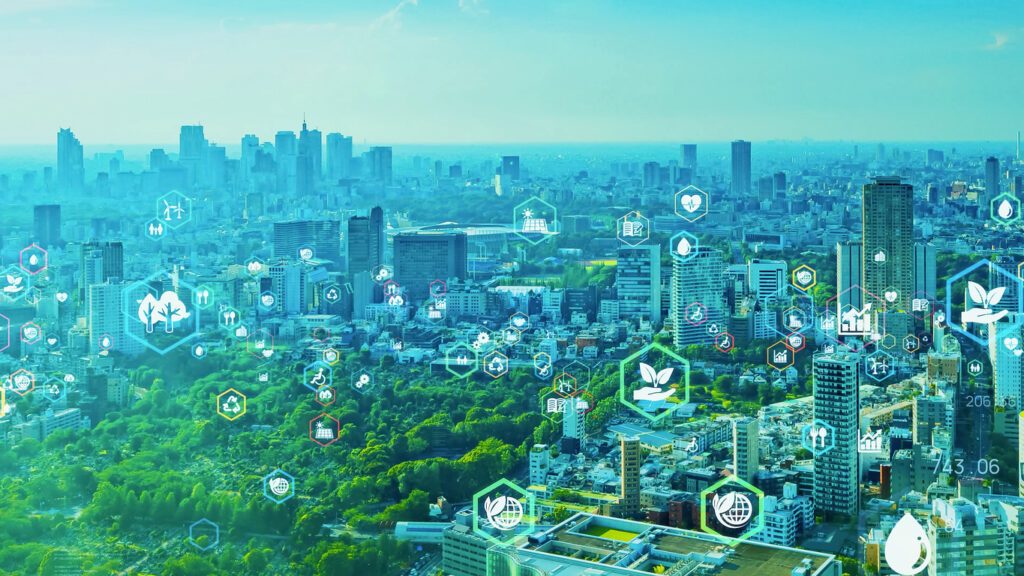
In today’s contemporary society, the concept of sustainability has increasingly become a guiding principle for individuals, businesses, and governments around the world.
The charter for the UCLA sustainability committee defined sustainability as “the integration of environmental health, social equity and economic vitality in order to create thriving, healthy, diverse and resilient communities for this generation and generations to come.
When it comes to sustainable development, the UN World Commission on Environment and Development defines it as “development that meets the needs of the present without compromising the ability of future generations to meet their own needs.”
And as we face the challenges brought about by climate change, depleting resources and social inequality, it has become more and more evident that the need to find innovative and sustainable solutions to our needs and problems is an urgent and pressing matter.
With the environmental, economic and societal challenges that arise each year, we are forced to adapt to new ways of living and adopt innovative and creative approaches to continue to survive and thrive in this ever-changing world.
This 2024, our collective efforts to rise above the challenges and come up with novel solutions in order to live a more sustainable future have given rise to a fresh wave of buzzwords that reflect the latest trends, and developments in this area.
2024 Buzzwords
1. Scope 3 Disclosure
Scope 3 is a company’s indirect emissions from its suppliers and end-users. According to Ivan Li, director of Sustainability Solutions at ENGIE Impact, “Businesses are gaining a clearer understanding of how addressing Scope 3 emissions is crucial in their journey towards achieving net-zero.
In fact, in the middle of 2023, the world saw the adoption of the first set of European Sustainability Reporting Standards by the EU. Because of this regulation, publicly traded companies in the European Union are now required to disclose their scope 3 emissions in their annual reports starting this year.
2. ESG Metrics
It’s time to say goodbye to the days when companies were mostly judged by their financial performance. Today, more than ever, people’s judgment is based on three metrics.
Environmental metrics
How does a company affect the planet? Are they doing something about their carbon emission? How do they use water? How do they dispose of their waste?
Social metrics
How do they treat people? How do they treat their customers? How do they show care for the community they operate in? What do the words equality, diversity, inclusion mean to them?
Governance metrics
This is all about how a company is being run. How do they treat their employees?
What are their working conditions? Are they treated fairly? Do they receive just
compensation? Is there a fair distribution of profit or are the top executives making a
hundred times more than the average employees?
In a recent study conducted by the Frontiers in Environmental Science, they found that
companies that perform well in ESG also perform better financially. In addition, they also
have a higher investor interest.
3. Sustainable Consumerism
More and more consumers nowadays say that they consider sustainability when they make a purchase. They also look for non-gmo, organic, eco-friendly products.
They care about what they put on their bodies and in their bodies. They care about a product’s environmental and social impact as well as its impact on their health.
The modern consumer prefers sustainable products over non-sustainable ones and companies must look for ways to meet these consumer needs in order to adapt to this emerging consumer lifestyle.
4. Sustainable Packaging
More and more consumers nowadays say that they consider sustainability when they
make a purchase. They also look for non-Gmo, organic, eco-friendly products.
They care about what they put on their bodies and in their bodies. They care about a product’s environmental and social impact as well as its impact on their health.
The modern consumer prefers sustainable products over non-sustainable ones and
companies must look for ways to meet these consumer needs in order to adapt to this
emerging consumer lifestyle.
4. Sustainable Packaging
With sustainable consumerism on the rise, companies must also look for sustainable packaging which, unfortunately, is more costly. In the Netherlands, they have added a tax on non-sustainable packaging in order to force companies to choose sustainable packaging over non-sustainable ones.
5. Circular Economy
Based on United Nations’ data, there will be 11 billion people living on our planet by the year 2100. With the world’s population rising every minute, there is also a rising concern about our limited natural resources.
This 2024, people will become more aware of the need for a circular economy where resources are reused and recycled. The goal of a circular economy is to have no use for landfills.
Businesses will have to seriously start caring about the environment and use every ounce of creativity and innovativeness on designing products that can easily be recycled or repurposed.
Everyone, businesses and consumers alike, will be forced to be more creative and think of ways in which a particular product can be reused, recycled, or repurposed over and over again.
Looking at these buzzwords, it is clear that the journey towards sustainability is not a walk in the park but it is a journey we all must be willing to take if we care for the planet and for ourselves. It’s time to recognize that we are all responsible for the world we live in. If we all rethink our ways and reinvent our systems, then the bright and sustainable future that we all want will cease to be a distant dream but a reality waiting to happen.
